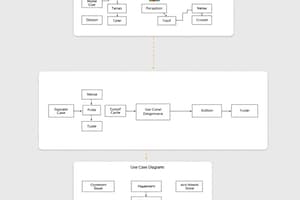Podcast
Questions and Answers
Modeling user interaction is not important in the development process.
Modeling user interaction is not important in the development process.
False (B)
UML activity diagrams are typically used for defining business process models.
UML activity diagrams are typically used for defining business process models.
True (A)
Each use case represents a continuous process within the system.
Each use case represents a continuous process within the system.
False (B)
Interaction models highlight the potential communication problems between system components.
Interaction models highlight the potential communication problems between system components.
Sequence diagrams are not suitable for interaction modeling purposes.
Sequence diagrams are not suitable for interaction modeling purposes.
Actors in a use case can only be people, not other systems.
Actors in a use case can only be people, not other systems.
A sequence diagram is used to model the interactions between the actors and the system within a use case.
A sequence diagram is used to model the interactions between the actors and the system within a use case.
A receptionist with appropriate security permissions can update patient information in the Mentcare system.
A receptionist with appropriate security permissions can update patient information in the Mentcare system.
A use case diagram is a type of UML diagram used to model the interactions between actors and objects within a system.
A use case diagram is a type of UML diagram used to model the interactions between actors and objects within a system.
The 'Transfer data' use case involves the patient as an actor.
The 'Transfer data' use case involves the patient as an actor.
A sequence diagram shows the overview of a use case.
A sequence diagram shows the overview of a use case.
UML is used to model the interactions between actors and the system within a use case.
UML is used to model the interactions between actors and the system within a use case.
Generalization is a technique used in modeling systems to manage complexity.
Generalization is a technique used in modeling systems to manage complexity.
In object-oriented languages like Java, generalization is implemented using interface mechanisms.
In object-oriented languages like Java, generalization is implemented using interface mechanisms.
Generalization allows us to learn detailed characteristics of every entity in a system.
Generalization allows us to learn detailed characteristics of every entity in a system.
Changes to higher-level classes do not affect lower-level classes in a generalization.
Changes to higher-level classes do not affect lower-level classes in a generalization.
In a generalization, lower-level classes inherit attributes and operations from higher-level classes.
In a generalization, lower-level classes inherit attributes and operations from higher-level classes.
Generalization is not a common technique used in system modeling and software engineering.
Generalization is not a common technique used in system modeling and software engineering.
Flashcards are hidden until you start studying
Study Notes
Process Models
- Process models reveal how the system being developed is used in broader business processes.
- UML activity diagrams may be used to define business process models.
Interaction Models
- Modeling user interaction helps to identify user requirements.
- Modeling system-to-system interaction highlights communication problems that may arise.
- Modeling component interaction helps understand if a proposed system structure is likely to deliver required system performance and dependability.
- Use case diagrams and sequence diagrams may be used for interaction modeling.
Use Case Modeling
- Use cases were developed originally to support requirements elicitation and are now incorporated into the UML.
- Each use case represents a discrete task that involves external interaction with a system.
- Actors in a use case may be people or other systems.
- Use cases are represented diagramatically to provide an overview and in a more detailed textual form.
Sequence Diagrams
- Sequence diagrams are part of the UML and are used to model the interactions between actors and objects within a system.
- A sequence diagram shows the sequence of interactions that take place during a particular use case or use case instance.
- Objects in a sequence diagram represent something in the real world, such as a patient, a prescription, or a doctor.
Classes and Associations
- Classes and associations are used to model the structure of a system.
- In the MHC-PMS, classes and associations are used to model the system's structure.
Generalization
- Generalization is an everyday technique used to manage complexity by grouping entities into classes.
- In modeling systems, generalization is used to examine classes and identify common characteristics.
- In object-oriented languages, such as Java, generalization is implemented using class inheritance mechanisms.
Studying That Suits You
Use AI to generate personalized quizzes and flashcards to suit your learning preferences.




